ACM MemberNet - Summer 2025

THE 2025 ACM AWARDS BANQUET
- ACM A.M. Turing Award
- ACM Prize in Computing
- ACM Charles P. “Chuck” Thacker Breakthrough in Computing Award
- ACM Luiz André Barroso Award
- ACM - AAAI Allen Newell Award
- Software System Award
- Grace Murray Hopper Award
- Paris Kanellakis Theory and Practice Award
- Karl V. Karlstrom Outstanding Educator Award
- Distinguished Service Award
- Outstanding Contribution to ACM Award
- ACM Eugene L. Lawler Award
- Athena Lecturer Award
- Doctoral Dissertation Award
- 2024 ACM Fellows
ACM ADVANCED MEMBER GRADES
TOP STORIES
- 12th Heidelberg Laureate Forum
- On Demand: Smart Technology, Fair Finance
- ACM Celebrates Impact Factor Success
ACM PEOPLE IN THE NEWS
- ACM President Yannis Ioannidis Sees a More Humane Role for AI
- David Patterson Opinion Featured in The Hill
PUBLIC POLICY
- Impact of ETPC Recommendations on the EU’s General-Purpose AI Code of Practice
- ACM Europe TPC Recommendations on Climate Disclosure in the AI Act
- ACM Europe TPC Recommendations on Greener Data Centers
PUBLISHING NEWS
- acmqueue: "WebAssembly: Yes, but for What"
- New Approved Journals
- Journals Welcome New Editor-in-Chiefs
- ACM Open: Digital Library Premium and Basic / New Agreements
SIG NEWS & AWARDS
DIVERSITY, EQUITY, & INCLUSION
- WomENcourage 2025
- ACM-W Seeks Applicants for Global Chapter Committee
- ACM Celebrates Pride Month 2025
MEMBERSHIP
LEARNING PROGRAMS
EDUCATION
STUDENT NEWS
CHAPTERS NEWS
DISTINGUISHED SPEAKERS PROGRAM
SOCIAL MEDIA
ACM CAREER & JOB CENTER
THE 2025 ACM AWARDS BANQUET
The ACM Awards Banquet is an annual event recognizing technical excellence and outstanding service to the computing field. This year's banquet honoring the 2024 award recipients and newly inducted ACM Fellows was held at the Palace Hotel in San Francisco on June 14.
ACM's awards celebrate our long tradition of honoring those whose contributions have impacted our world for the better in countless ways. These prestigious and internationally recognized honors are an integral part of ACM's mission to unite computing educators, researchers, and professionals to inspire dialogue, share resources, and address the field's challenges.
View our photo album of the banquet here.
View our awards video playlist here, highlighting the 2024 award recipients' work, research, and contributions to the field of computing.
ACM A.M. Turing Award
The ACM A.M. Turing Award was presented to Andrew G. Barto and Richard S. Sutton for developing the conceptual and algorithmic foundations of reinforcement learning. In a series of papers beginning in the 1980s, Barto and Sutton introduced the main ideas, constructed the mathematical foundations, and developed important algorithms for reinforcement learning—one of the most important approaches for creating intelligent systems.
Learn more in this short video.
Accompanied by a prize of $1,000,000, ACM's most prestigious award is given to recognize contributions of a technical nature which are of lasting and major technical importance to the computing field. Financial support for the A.M. Turing Award is provided by Google Inc.
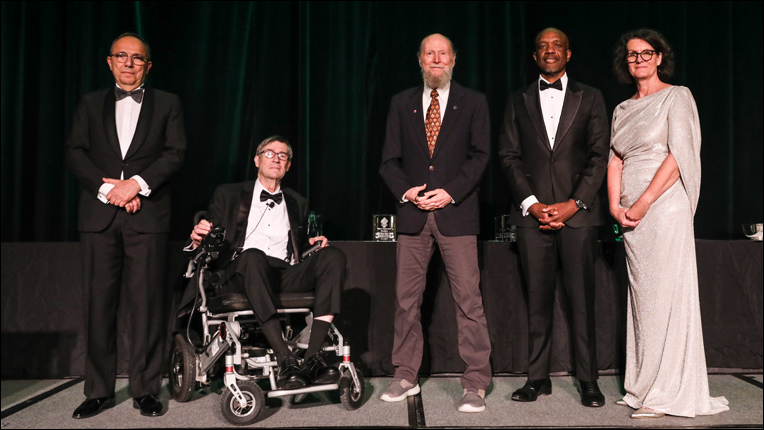
ACM President Yannis Ioannidis, A.M. Turing Award recipients Andrew G. Barto and Richard S. Sutton, James Manyika (Google), and ACM Past President Gabriele Kotsis
ACM Prize in Computing
The ACM Prize in Computing was presented to Torsten Hoefler for fundamental contributions to high-performance computing and the ongoing AI revolution. Hoefler developed many of the core capabilities of modern supercomputers and defined key aspects of the algorithms for distributing AI models on them. The work of Hoefler and his colleagues to scale network design in supercomputers has revolutionized the capabilities of these large systems.
Learn more in this short video.
The ACM Prize in Computing recognizes an early- to mid-career fundamental innovative contribution in computing that, through its depth, impact, and broad implications, exemplifies the greatest achievements in the discipline. The award carries a prize of $250,000. Financial support is provided by Infosys Ltd.
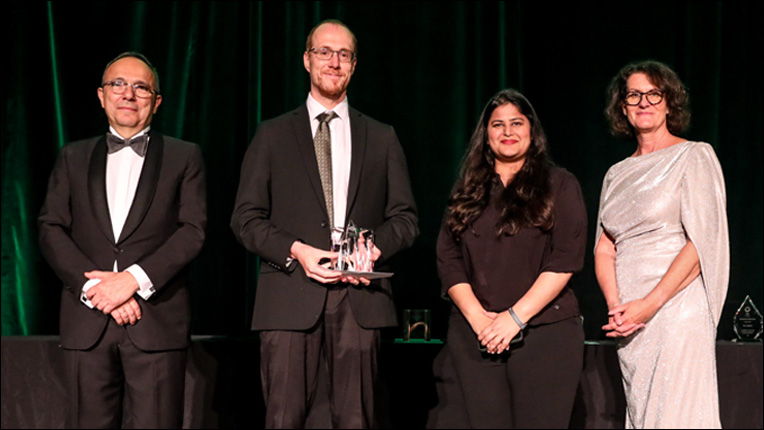
Yannis Ioannidis, ACM Prize recipient Torsten Hoefler, Kisha Gupta (Infosys), and Gabriele Kotsis
ACM Charles P. “Chuck” Thacker Breakthrough in Computing Award
The ACM Charles P. “Chuck” Thacker Breakthrough in Computing Award was presented to Jason Cong for fundamental contributions to the design and automation of field-programmable systems and customizable computing. During his career in both academia and industry, Cong developed an extraordinary array of tools to automate integrated circuit design FPGAs.
Learn more in this short video.
Presented biennially to an individual who has exemplified excellence and/or innovation in mentoring with particular attention to recognition of individuals who have shown outstanding leadership in promoting diversity, equity, and inclusion in computing. The award is presented at the ACM Award Banquet and is accompanied by a prize of $25,000 to the awardee, and an additional $10,000 cash contribution to an approved charity of the awardee’s choice. Financial support is provided by Microsoft Research.
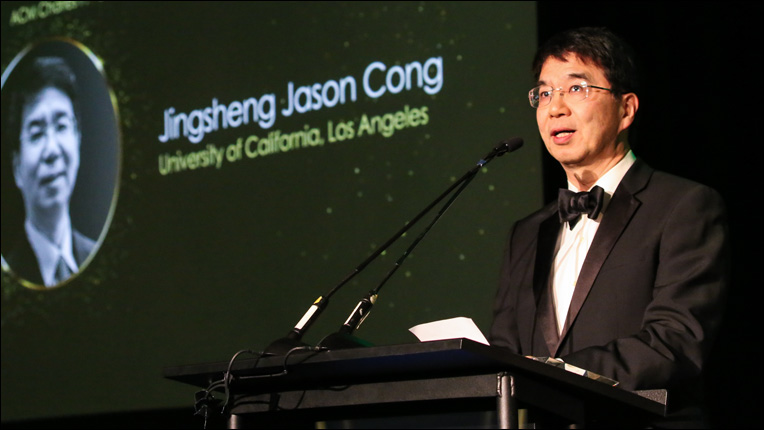
ACM Thacker Award recipient Jason Cong
ACM Luiz André Barroso Award
The ACM Luiz André Barroso Award was presented to Rachid Guerraoui for theoretical and applied contributions to distributed computing and impactful work on promoting computer science in Africa. He has made groundbreaking contributions that have shaped the landscape of distributed computing, provided new insights into managing transactions in concurrent environments, and has provided tools and frameworks for understanding and optimizing transaction performance.
Learn more in this short video.
The award is named after Luiz André Barroso, a Brazilian computer engineer who pioneered the design of the modern data center and was a strong supporter of equal opportunity for everyone. It was established to recognize researchers from historically underrepresented communities who have made fundamental contributions to computer science. The award carries a cash prize of $40,000 plus an additional $10,000 cash contribution to an approved charity of the awardee's choice. Financial support is provided by Google.
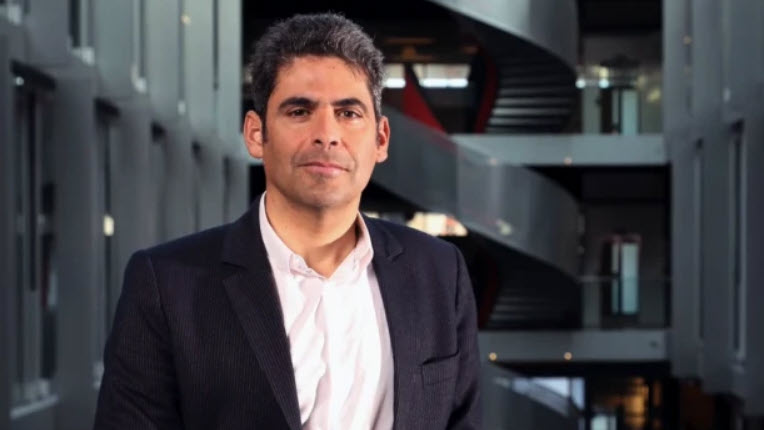
ACM Luiz André Barroso Award recipient Rachid Guerraoui
ACM - AAAI Allen Newell Award
The ACM - AAAI Allen Newell Award was presented to Peter Stone for significant contributions to the theory and practice of artificial intelligence (AI), especially in reinforcement learning, multiagent systems, transfer learning, and intelligent robotics. His groundbreaking work on reinforcement learning algorithms has enabled robots to acquire skills through experience.
Learn more in this short video.
The award is named for Allen Newell, a trailblazer in computer science research and education, and a founder of the artificial intelligence and cognitive science fields. The Newell Award is presented to individuals selected for career contributions that have breadth within computer science, or that bridge computer science and other disciplines. It is accompanied by a $10,000 prize provided by ACM and the Association for the Advancement of Artificial Intelligence, and by individual contributions.
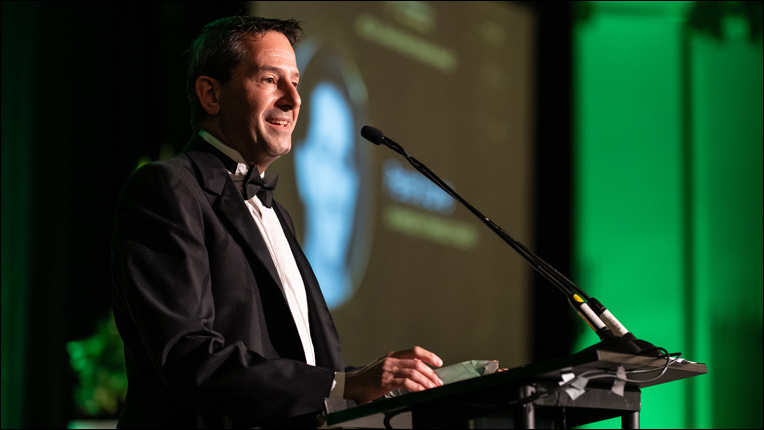
ACM-AAAI Allen Newell Award recipient Peter Stone
Software System Award
The Software System Award was presented to William Gropp, Pavan Balaji, Rajeev Thakur, Yanfei Guo, Kenneth Raffenetti, and Hui Zhou for MPICH, which has powered 30 years of progress in computational science and engineering by providing scalable, robust, and portable communication software for parallel computers. The development of the MPICH software system began in 1992 as proof-of-concept for the emerging Message Passing Interface (MPI) standard.
Learn more in this short video.
The Software System Award is presented to an institution or individuals recognized for developing a software system that has had a lasting influence, reflected in contributions to concepts, in commercial acceptance, or both. A prize of $35,000 accompanies the award, with financial support provided by IBM.
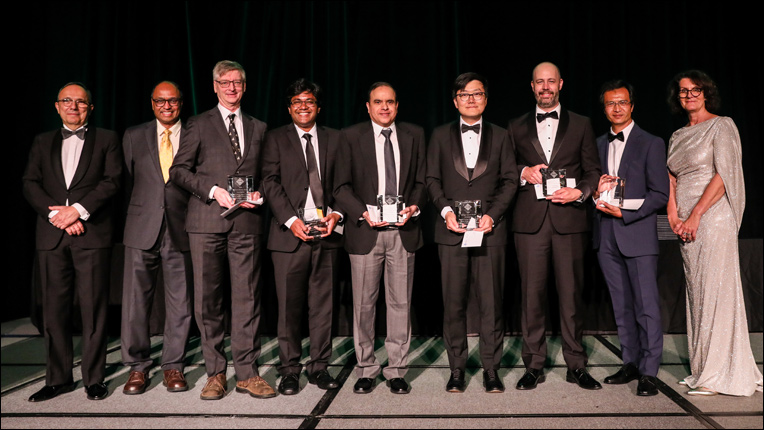
Yannis Ioannidis, Sandeep Gopisetty (IBM), Software System Award recipients William Gropp, Pavan Balaji, Rajeev Thakur, Yanfei Guo, Kenneth Raffenetti, and Hui Zhou, and Gabriele Kotsis
Grace Murray Hopper Award
The Grace Murray Hopper Award was presented to Ilias Diakonikolas for making contributions to the field of algorithmic robust statistics by introducing new techniques to robustly estimate high-dimensional distributions along with a surprising variety of algorithmic applications. The new paradigms that Diakonikolas developed changed the way we think about what is possible for efficient algorithms that process high-dimensional data.
Learn more in this short video.
The award is named for Admiral Grace Murray Hopper, a pioneer in software development whose work spanned programming languages, software development concepts, compiler validation, and data processing. The Hopper Award is presented to the outstanding young computer professional of the year, selected on the basis of a single recent major technical or service contribution. The candidate must have been 35 years of age or less at the time the qualifying contribution was made. A prize of $35,000 accompanies the award, with financial support provided by Microsoft Research.
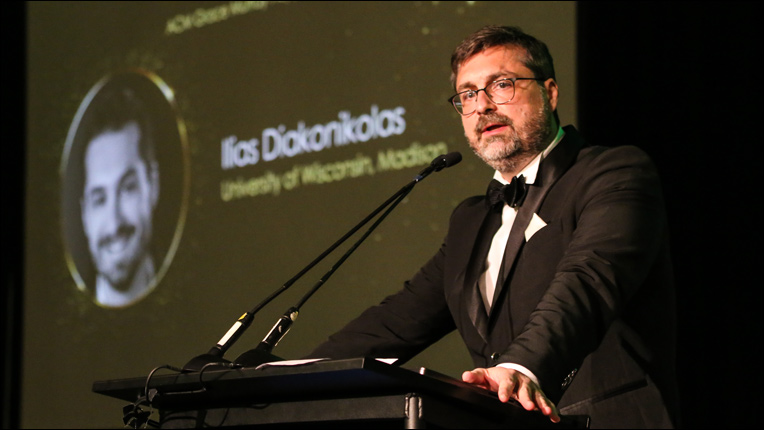
Hopper Award recipient Ilias Diakonikolas
Paris Kanellakis Theory and Practice Award
The Paris Kanellakis Theory and Practice Award was presented to Hugo Krawczyk for pioneering and lasting contributions to the theoretical foundations of cryptographically secure communications, and to the protocols that form the security foundations of the Internet. Krawczyk’s most high-profile contribution is his work on the SIGMA authenticated key-exchange protocol. SIGMA has become a cornerstone of the most widely used communication protocols on the Internet.
Learn more in this short video.
The award is named for Paris Christos Kanellakis, who, as a distinguished computer science theoretician and esteemed faculty member of Brown University, focused much of his work in the area of theoretical computer science, particularly the principles of database systems and logic. The Kanellakis Award honors specific theoretical accomplishments that have had a significant and demonstrable effect on the practice of computing. It is accompanied by a prize of $10,000 and is endowed by contributions from the Kanellakis family, and financial support by ACM's Special Interest Groups SIGACT, SIGDA, SIGMOD, and SIGPLAN, the ACM SIG Project Fund, and individual contributions.
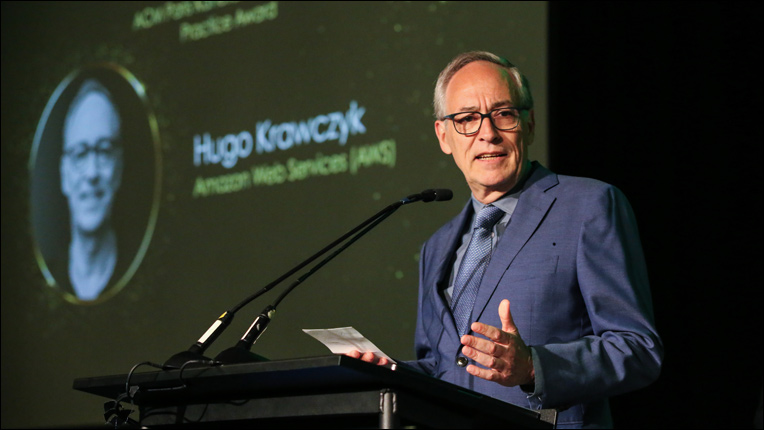
Kanellakis Award recipient Hugo Krawczyk
Karl V. Karlstrom Outstanding Educator Award
The Karl V. Karlstrom Outstanding Educator Award was presented to Dan Garcia and Brian Harvey for their advocacy of and advances in education to bring the beauty and joy of computing to all students, especially those from historically underrepresented communities. Together Garcia and Harvey have been instrumental in expanding computer science education, most notably through the development of the Beauty and Joy of Computing (BJC) curriculum, which began as a national pilot for the CSforALL movement.
Learn more in this short video.
The Karlstrom Award is presented annually to an outstanding educator who is appointed to a recognized educational baccalaureate institution; recognized for advancing new teaching methodologies; effecting new curriculum development or expansion in computer science and engineering; or making a significant contribution to ACM's educational mission. Those teachers with 10 years or less experience are given special consideration. The Karlstrom Award is accompanied by a prize of $10,000, with financial support provided by ACM.
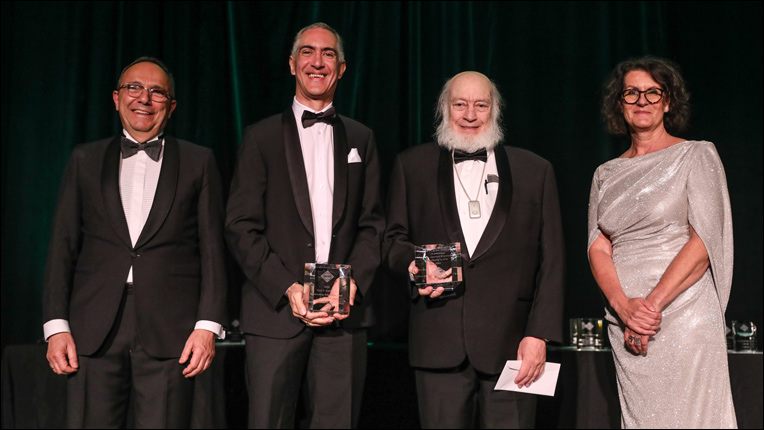
Yannis Ioannidis, Karlstrom Award recipients Dan Garcia and Brian Harvey, and Gabriele Kotsis
Distinguished Service Award
The Distinguished Service Award was presented to Manish Parashar for service and leadership in furthering the transformative impact of computer and computational science on science and engineering. Parashar’s record of service includes leadership at the National Science Foundation (NSF), where he developed NSF’s strategic vision for a national cyberinfrastructure, as well as at the White House’s Office of Science and Technology Policy (OSTP), where he developed the Future Advancement Computing Ecosystem Strategic Plan (FACE).
Learn more in this short video.
The Distinguished Service Award is given on the basis of value and degree of service to the computing community. The contributions are not limited to service to the Association and should include activities in other computer organizations and should emphasize contributions to the computing community at large.
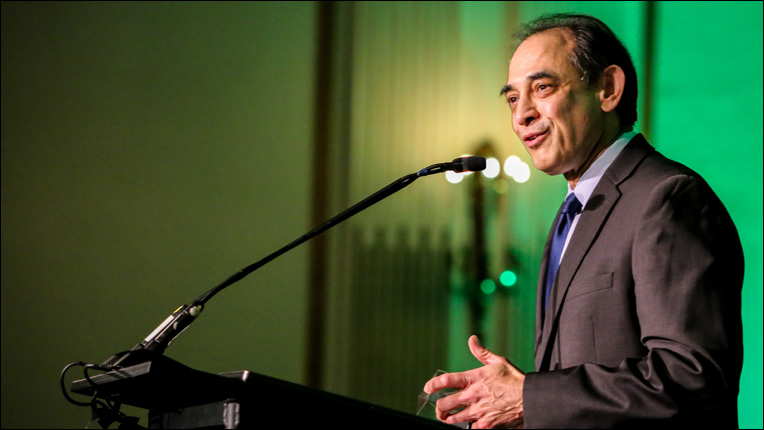
Distinguished Service Award recipient Manish Parashar
Outstanding Contribution to ACM Award
The Outstanding Contribution to ACM Award was presented to Judith Gal-Ezer in recognition of her sustained contributions to computer science education policy and research and, more broadly, to the ACM Europe Council. Gal-Ezer has been an internationally recognized leader in computing education. For her accomplishments, she has received the ACM Karl V. Karlstrom Outstanding Educator Award as well as the ACM SIGCSE Award for Outstanding Contribution to Computer Science Education.
Learn more in this short video.
The Outstanding Contribution to ACM Award recognizes outstanding service contributions to the Association. Candidates are selected based on the value and degree of service overall and may be given to up to three individuals each year.
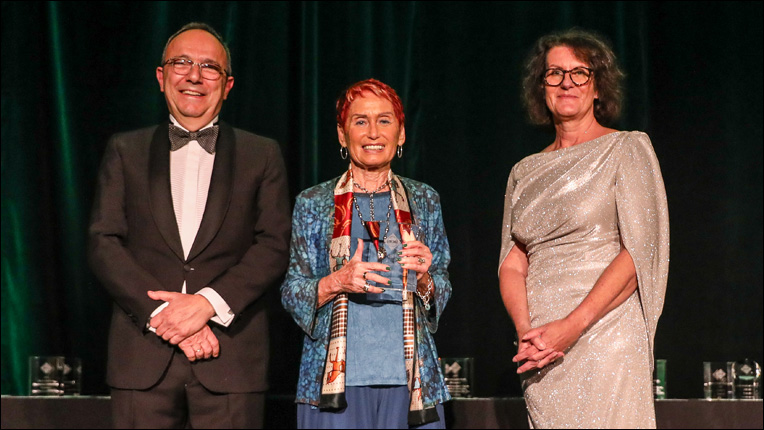
Yannis Ioannidis, Outstanding Contribution to ACM Award recipient Judith Gal-Ezer, and Gabriele Kotsis
ACM Eugene L. Lawler Award for Humanitarian Contributions Within Computer Science and Informatics
The ACM Eugene L. Lawler Award for Humanitarian Contributions within Computer Science and Informatics was presented to Maja Matarić for Humanitarian Contributions within Computer Science and Informatics for pioneering socially assistive robotics (SAR) for improving wellness and quality of life for users with special needs. Over the past two decades, Matarić has been the leading figure in the field of socially assistive robotics. These robots are designed to gain insights into the drivers of human behavior related to overcoming challenges.
Learn more in this short video.
The Eugene L. Lawler Award for Humanitarian Contributions within Computer Science and Informatics recognizes an individual or group who has made a significant contribution through the use of computing technology. The award is presented in alternate years, at the June Awards Banquet and is accompanied by a prize of $5,000 plus travel expenses to the banquet.
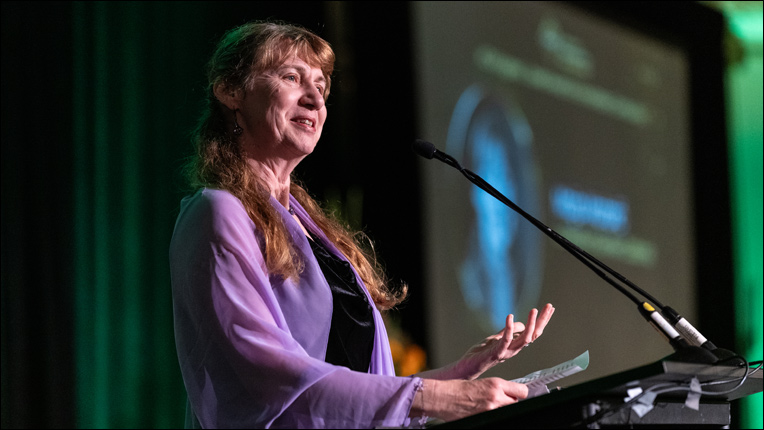
ACM Lawler Award recipient Maja Matarić
ACM Athena Lecturer Award
The ACM Athena Lecturer Award was presented to Cordelia Schmid for outstanding contributions to computer vision in image retrieval, object recognition, and video understanding. Her work has helped computers understand, perceive, and interact with the visual world. In keeping with the Athena Lecturer Award’s goal of honoring both technical and service contributions, Schmid is recognized for building an active research community. Her skills in mentorship and supervision are also renowned among her peers.
Learn more in this short video.
The ACM Athena Lecturer Award recognition celebrates women researchers who have made fundamental contributions to computer science. The award carries a cash prize of $25,000, with financial support provided by Two Sigma. The recipient gives an invited talk at a major ACM conference of her choice.
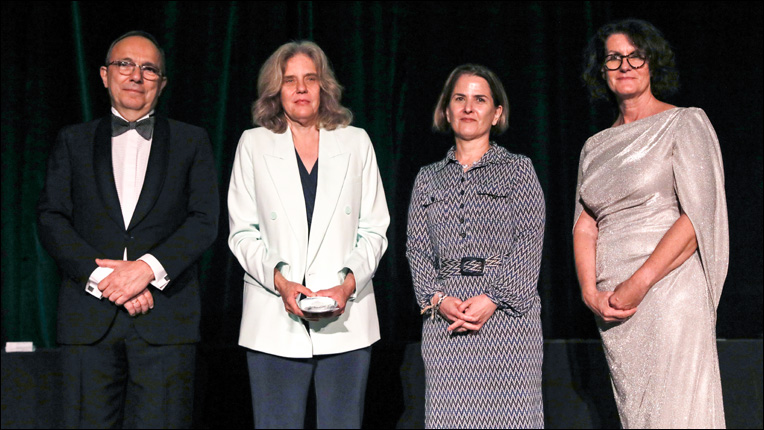
Yannis Ioannidis, Athena Lecturer Award recipient Cordelia Schmid, Effie Baram (Two Sigma), and Gabriele Kotsis
Doctoral Dissertation Award
The Doctoral Dissertation Award was presented to Ashish Sharma for his dissertation “Human-AI Collaboration to Support Mental Health and Well Being.” Sharma developed fundamental advances in natural language processing to positively impact the mental health of many people.
Honorable Mentions went to Alexander (Zander) Kelley for his dissertation “Explicit Pseudorandom Distributions for Restricted Models of Computation” toward a PhD earned at the University of Illinois Urbana-Champaign; and Sewon Min for her dissertation “Rethinking Data Use in Large Language Models” toward a PhD earned at the University of Washington.
The Doctoral Dissertation Award is presented annually to the author(s) of the best doctoral dissertation(s) in computer science and engineering. The award is accompanied by a prize of $20,000 and the honorable mention is accompanied by a prize totaling $10,000. Winning dissertations will be published in the ACM Digital Library as part of the ACM Books Series.
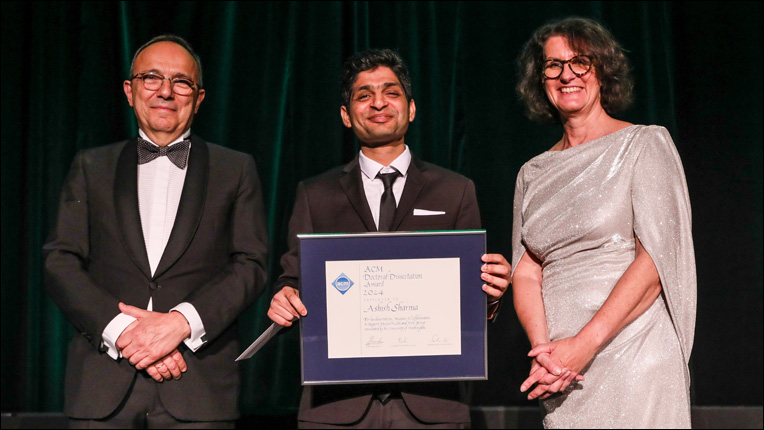
Yannis Ioannidis, Doctoral Dissertation Award recipient Ashish Sharma, and Gabriele Kotsis
2024 ACM Fellows
The ACM Fellows Program was established in 1993 to recognize and honor outstanding ACM members for their achievements in computer science and information technology and for their significant contributions to the mission of ACM. The ACM Fellows serve as distinguished colleagues to whom ACM and its members look for guidance and leadership as the world of information technology evolves.
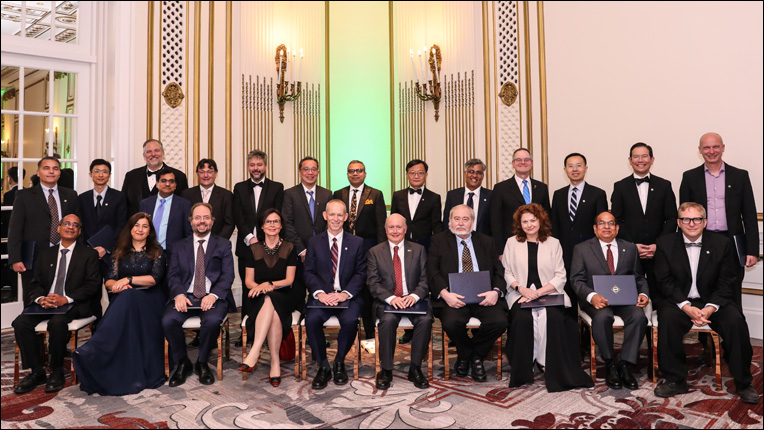
The 2024 ACM Fellows
The 2024 Fellows are:
- Marc Alexa, Technische Universität Berlin
- Marcelo Arenas, Catholic University of Chile
- Michael Bailey, Georgia Institute of Technology
- Arindam Banerjee, University of Illinois at Urbana Champaign
- Clark Barrett, Stanford University
- Susanne Bødker, Aarhus University
- Satish Chandra, Google
- Marsha Chechik, University of Toronto
- Lei Chen, Hong Kong University of Science and Technology
- Wei Chen, Microsoft Research Asia
- Carla Fabiana Chiasserini, Politecnico di Torino
- Fred Chong, University of Chicago
- Diane Joyce Cook, Washington State University
- Stephen David Crocker, Edgemoor Research Institute
- Brian Curless, University of Washington
- Luca de Alfaro, University of California Santa Cruz
- Maarten de Rijke, University of Amsterdam
- Edward J. Delp, Purdue University
- Falko Dressler, Technische Universität Berlin
- Derek Dreyer, Max Planck Institute for Software Systems
- Niklas Elmqvist, Aarhus University
- Michal Feldman, Tel Aviv University
- Nate Foster, Cornell University
- Ashish Goel, Stanford University
- Sudipto Guha, Zscaler
- Jeffrey Michael Heer, University of Washington
- Russell Housley, Vigil Security, LLC
- Scott Hudson, Carnegie Mellon University
- Mohan Kankanhalli, National University of Singapore
- Irwin King, The Chinese University of Hong Kong
- Cliff Lampe, University of Michigan
- Stefano Leonardi, Sapienza Universita Di Roma
- Guoliang Li, Tsinghua University
- Azad M. Madni, University of Southern California
- Tim J. Menzies, North Carolina State University
- Mira Mezini, Technische Universität Darmstadt
- Sudip Misra, Indian Institute of Technology, Kharagpur
- Bashar A. Nuseibeh, Open University
- Peter W. O'Hearn, University College London
- Fatma Ozcan, Google
- Rasmus Pagh, University of Copenhagen
- Dhabaleswar K. Panda, The Ohio State University
- Naren Ramakrishnan, Virginia Tech
- Dana Randall, Georgia Institute of Technology
- Abhik Roychoudhury, National University of Singapore
- Claudio T. Silva, New York University
- Thad Starner, Georgia Institute of Technology
- Qi Tian, Huawei Technologies, Ltd.
- Anwar Walid, Defense Unicorns and Columbia University
- Haixun Wang, EvenUp Law
- Guoliang Xing, The Chinese University of Hong Kong
- Feng Zhao, Tsinghua University
- Jingren Zhou, Alibaba Cloud
- Justin Zobel, University of Melbourne
- Benjamin G. Zorn, Microsoft Corporation
View the complete listing of ACM Fellows.
ACM ADVANCED MEMBER GRADES
Advanced Member Grade Nomination Information
Fellow is ACM's most prestigious member grade recognizing the top 1% of ACM members for their outstanding accomplishments in computing and information technology and/or outstanding service to ACM and the larger computing community. The deadline for nominations is September 7, 2025.
The Senior Member advanced grade of membership recognizes ACM members with at least 10 years of professional experience and 5 years of continuous ACM Professional membership. Nominations are accepted on a quarterly basis. The deadline for nominations is September 3, 2025.
TOP STORIES
12th Heidelberg Laureate Forum
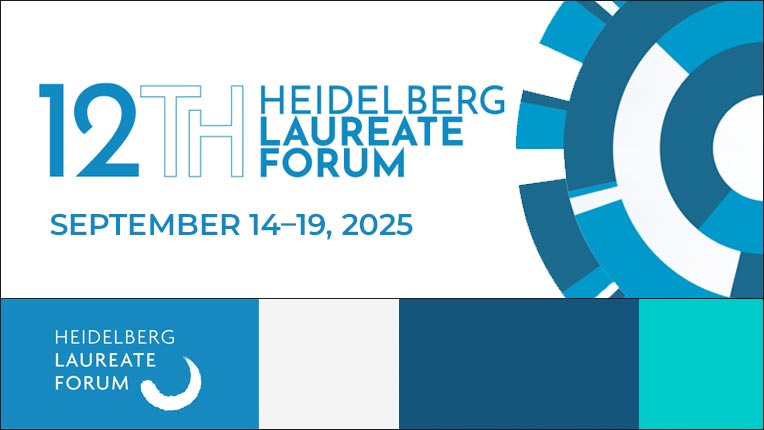
The 12th Heidelberg Laureate Forum will offer young researchers and other participants the opportunity to connect with scientific pioneers and learn how the laureates made it to the top of their fields as some of the brightest minds in mathematics and computer science come together for an unrestrained, interdisciplinary exchange. Notable participants this year include 19 ACM Award recipients including ACM A.M. Turing Award recipients Avi Wigderson, Robert Metcalfe, Jack Dongarra, John Hopcroft, and Vinton Cerf, as well as ACM Prize in Computing recipients Torsten Hoefler, Amanda Randles, and David Silver among many others. The 12th HLF is being held from September 14 - 19 in Heidelberg, Germany. Sessions will also be livestreamed on the HLF website. The event will also be documented on the HLF YouTube channel.
On Demand: Smart Technology, Fair Finance
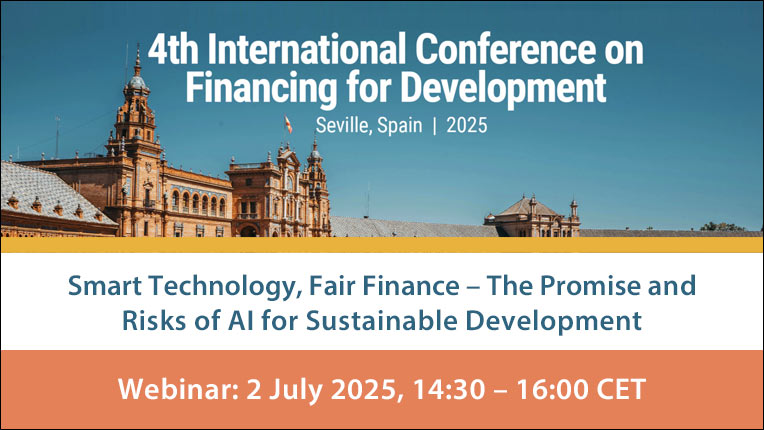
As digital technologies and artificial intelligence reshape global economies, the need for responsible AI governance and inclusive standards has become urgent, and digital innovations risk deepening divides or reinforcing inequities. On this topic, ACM hosted "Smart Technology, Fair Finance - The Promise and Risks of AI for Sustainable Development" at the International Conference on Financing for Development, 30 June – 3 July 2025, Seville, Spain. The event featured a keynote address by ACM Technology Policy Council member Mohan Kankanhalli and a panel discussion moderated by ACM President Yannis Ioannidis and ACM Technology Policy Council Co-Chair Virginia Dignum. This session explores strategic investments in digital infrastructure, ethical AI deployment, climate-smart technologies, the risks of digital exclusion, and unintended harms when AI and digital systems are poorly governed. View the special panel here.
ACM Celebrates Impact Factor Success
ACM, the Association for Computing Machinery, is proud to celebrate the strong success of its publications in the latest Journal Citation Reports (JCR) from Clarivate Analytics, with over 75% of ACM journals indexed in the JCR increasing their impact factors and the highest number to date of journals ranked in the first quartile in one or more categories. Leading survey and tutorial journal ACM Computing Surveys (CSUR) continued its multi-year ascent in the rankings with an all-time-high impact factor of 28.0, taking top ranking in the Computer Science, Theory & Methods category for the second year in a row. Read the ACM news release.
ACM PEOPLE IN THE NEWS
ACM President Yannis Ioannidis Sees a More Humane Role for AI
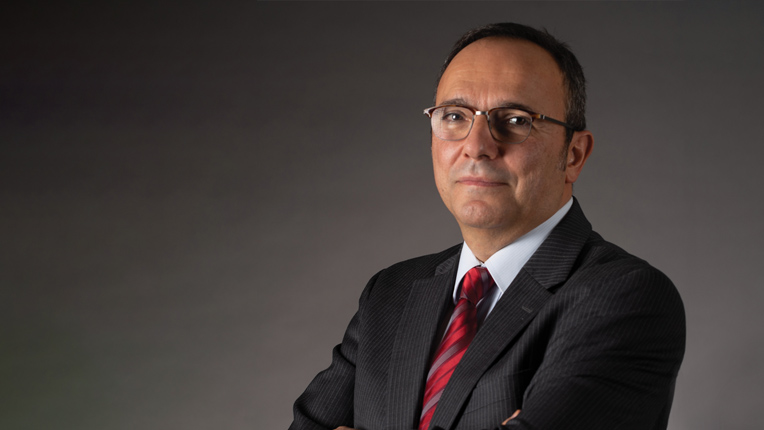
The Fourth International Conference on Financing for Development (FFD4) in Seville, Spain saw ACM host its first Smart Technology, Fair Finance webinar, exploring the promise and perils of artificial intelligence (AI) in global development finance. In an exclusive interview with Computer Weekly, ACM President Yannis Ioannidis explained why this moment marks a turning point for the computing profession’s engagement in global development, and what must happen next. “Historically, ACM hasn’t fully acknowledged the profound impact computing professionals can have on global development,” he said. “But our mindset has shifted—we now want to engage more meaningfully.” Read the full interview here.
David Patterson Opinion Featured in The Hill

ACM A.M. Turing Award laureate and ACM Past President David Patterson recently penned an opinion piece for The Hill in which he goes against Congress moving to cut funding for the National Science Foundation that could lead to future breakthroughs. He strongly contends that investing in innovation is not wasteful spending—rather, that it is one of the smartest investments Washington makes, creating new jobs, stronger businesses, and higher tax revenue in every corner of the country. He also believes that cutting the budget of the Directorate for Computer and Information Science and Engineering would be a self-inflicted blow to American competitiveness. Read the article here.
PUBLIC POLICY
Impact of ETPC Recommendations on the EU’s General-Purpose AI Code of Practice
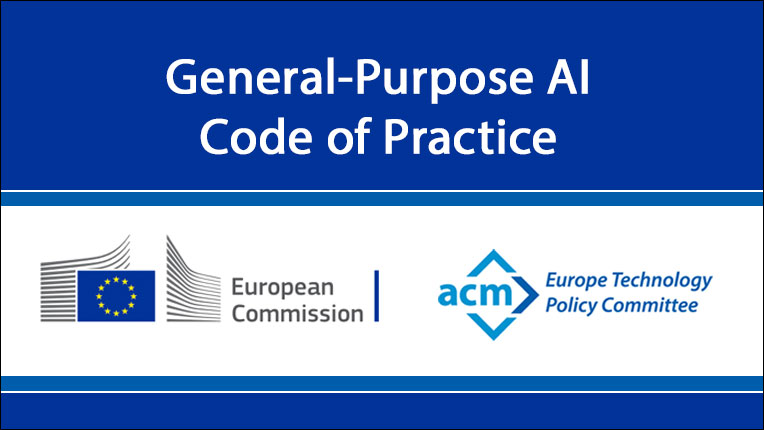
At the invitation of the European Commission, the ACM Europe Technology Policy Committee (ETPC) submitted a number of recommendations towards the development of a General-Purpose AI Code of Practice (GPAI). The GPAI is intended to help industry comply with the AI Act legal obligations on safety, transparency and copyright of general-purpose AI models. We are proud to announce that several of those recommendations have now been incorporated into the GPAI. Learn more here.
Policy Brief on the EU AI Act For True Environmental Accountability

Europe TPC provided the European Commission with specific recommendations to strengthen environmental accountability under the AI Act. Its key point was that the law’s current provisions omit critical climate disclosures, particularly around inference-phase energy use, indirect emissions, and AI-specific water consumption. The brief outlines concrete amendments to ensure transparency, comparability, and public access to AI-related climate data. Learn more here.
ACM Europe TPC Recommendations on Greener Data Centers
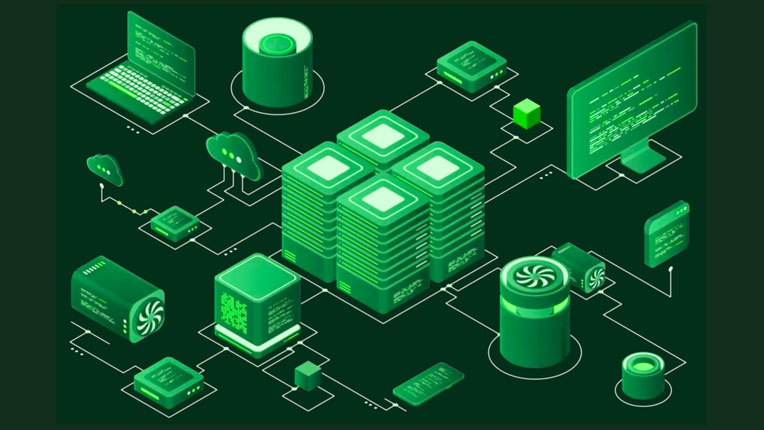
Europe TPC submitted a policy brief to the European Commission outlining five recommendations to strengthen sustainability requirements for data centers. Its key point was that current EU legislation lacks binding efficiency targets and comprehensive reporting obligations. The brief calls for enforceable standards on energy and water usage, broader facility coverage, enhanced transparency, and long-term planning to manage AI-related demand growth. Learn more here.
PUBLISHING NEWS
acmqueue: "WebAssembly: Yes, but for What?"
Andy Wingo introduces a special issue of Queue devoted to WebAssembly (Wasm), writing "WebAssembly has found a niche but not yet filled its habitable space." He tallies the early Wasm wins and losses to identify winning patterns, and then extracts commonalities between these patterns to answer the question of what makes for a successful Wasm deployment. He then suggests new areas where Wasm will find purchase in the next two to three years. Read the full article here.
New Approved Journals
ACM has approved a new journal, ACM Transactions on AI Security and Privacy (TAISAP). The primary scope of TAISAP is to develop methods for assessing the security of AI models, AI-enabled systems, and broader AI environments. In this context, security includes: (1) the security of AI models, including adversarial attacks on AI and technical vulnerabilities of AI, (2) privacy concerns in AI, and (3) the deployment of AI and machine learning in cybersecurity applications, including security operations centers and cyber threat intelligence. Broader socio-technical themes such as AI safety, dependability, and governance are considered out of scope for TAISAP.
ACM has approved a new journal, ACM AI Letters (AILET), envisioned to become the premier rapid-publication venue for impactful, concise, and timely communications in AI. Bridging a crucial gap between traditional conferences and journals, ACM AI Letters will feature short peer-reviewed contributions that accelerate knowledge dissemination across academia and industry. This unique publication prioritizes theoretical breakthroughs, algorithmic innovation, practical real-world applications, and critical societal implications, including ethics, policy, and responsible AI. For more information on AILET, contact: [email protected].
Journals Welcome New Editor-in-Chiefs
ACM Computing Surveys (CSUR) welcomes My T. Thai (University of Florida, USA) and Hanghang Tong (University of Illinois at Urbana-Champaign, USA) as Co-Editors-in-Chief, with a term beginning July 1, 2025.
ACM Formal Aspects of Computing (FAC) welcomes Einar Broch Johnsen (University of Oslo, Norway) and Maurice ter Beek (CNR-ISTI, Italy) as its new Co-Editors-in-Chief for the term of July 1, 2025 to June 30, 2028
ACM's new journal, ACM Transactions on AI Security and Privacy (TAISAP)—which aims to develop methods for assessing the security of AI models, AI-enabled systems, and broader AI environments—welcomes their inaugural Co-Editors-in-Chief. They are Murat Kantarcioglu (Virginia Tech), Patrick McDaniel (University of Wisconsin-Madison), and Sagar Samtani (Indiana University). Their term is from April 1, 2025 through March 31, 2028.
ACM's new journal, ACM AI Letters (AILET)—which aims to become the premier rapid-publication venue for impactful, concise, and timely communications in AI—welcomes their inaugural Co-Editors-in-Chief. They are Nitesh Chawla, University of Notre Dame, USA; Barry O’Sullivan, University College Cork, Ireland; and Richa Singh, IIT Jodhpur, India. Their term is from June 1, 2025 through May 31, 2028. For more information on AILET, contact: [email protected].
ACM Transactions on Social Computing (TSC) welcomes new Co-Editors-in-Chief Xiaoming Fu (University of Göttingen, Germany) and James Evans (University of Chicago) for a term starting May 1, 2025.
ACM Open: Digital Library Premium and Basic / New Agreements
To support the shift to 100% Open Access in 2026, ACM is introducing two levels of access Digital Library Premium and Digital Library Basic. Digital Library Premium is an institutional subscription model offering authors and researchers the full scope of features and functionality of the Digital Library. The Basic option provides public access to ACM content with limited features. Multi-year pricing and discounts for Premium are available now.
Also, ACM has secured two new three-year, nationwide Transformative Agreements: India’s One Nation One Subscription (ONOS), covering 6,500 publicly funded institutions; and eight regional Canadian consortia, representing 72 institutions. Both agreements—and a growing list of others—can now be explored via our new ACM participants page.
SIG NEWS & AWARDS
2025 SIGMOD Awards
The ACM SIGMOD/PODS International Conference on Management of Data was held June 22-27, 2025 in Berlin, Germany. Awards were received for Research Track Best Paper, Industry Track Best Paper, Edgar F. Codd Innovations Award, Contributions Award, the Test of Time Award, and more. Learn more about the recipients here.
Best Paper Awards Given at Recent ACM SIG Conferences
ACM's Special Interest Groups (SIGs) regularly cite outstanding individuals for their contributions in 37 distinct technological fields. Some awards presented (or to be presented) at conferences:
- CI '25: Collective Intelligence Conference
- ICER '25: ACM Conference on International Computing Education Research
- RESPECT '25: Conference for Research on Equitable and Sustained Participation in Engineering, Computing, and Technology
- ICTIR '25: International ACM SIGIR Conference on Innovative Concepts and Theories in Information Retrieval (ICTIR)
- ETRA '25: 2025 Symposium on Eye Tracking Research and Applications
- HotStorage '25: 17th ACM Workshop on Hot Topics in Storage and File Systems
- SACMAT '25: The 30th ACM Symposium on Access Control Models and Technologies
- FSE '24: 32nd ACM International Conference on the Foundations of Software Engineering
- ICMR '25: International Conference on Multimedia Retrieval
- DIS '25: Designing Interactive Systems Conference
- WiSec '25: 18th ACM Conference on Security and Privacy in Wireless and Mobile Networks
- ITiCSE '25: Innovation and Technology in Computer Science Education
- EC '25: The 26th ACM Conference on Economics and Computation
- FAccT '25: The 2025 ACM Conference on Fairness, Accountability, and Transparency
- IMX '25: ACM International Conference on Interactive Media Experiences
- EICS '25: The 17th ACM SIGCHI Symposium on Engineering Interactive Computing Systems
- SIGMOD/PODS '25: International Conference on Management of Data
- ISCA '25: The 52nd Annual International Symposium on Computer Architecture
- PASC '25: Platform for Advanced Scientific Computing Conference
- IFL '24: 36th Symposium on Implementation and Application of Functional Languages
- PLDI '25: ACM SIGPLAN Conference on Programming Language Design and Implementation
- IH&MMSEC '25: ACM Workshop on Information Hiding and Multimedia Security
- IDC '25: Interaction Design and Children
- SIGMETRICS '25: ACM SIGMETRICS International Conference on Measurement and Modeling of Computer Systems
- DEBS '25: The 19th ACM International Conference on Distributed and Event-based Systems
- CODASPY '25: Fifteenth ACM Conference on Data and Application Security and Privacy
- Websci '25: 17th ACM Web Science Conference
- SAC '25: The 40th ACM/SIGAPP Symposium on Applied Computing
- I3D '25: Symposium on Interactive 3D Graphics and Games
DIVERSITY, EQUITY, AND INCLUSION
ACM Celebration of Women in Computing: womENcourage 2025
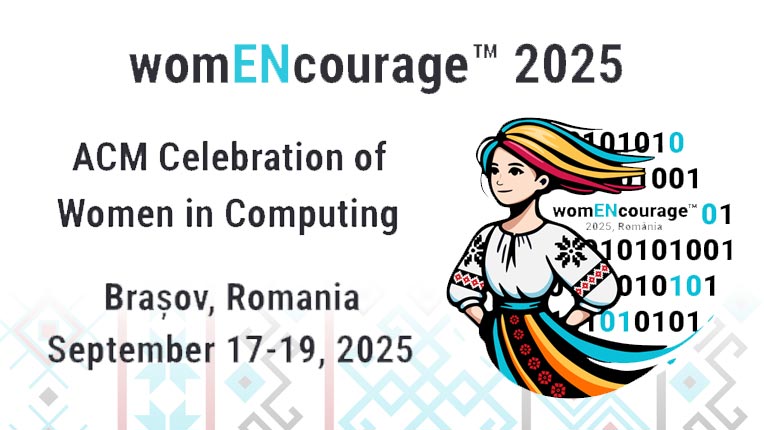
The ACM Celebration of Women in Computing: womENcourage 2025, is an ACM initiative celebrating the achievements of women in computing, established by ACM-W Europe with the goal of fostering connections among women across various technical disciplines and motivating them to continue their education and careers in the field of computing. The event serves as a platform for undergraduate and graduate students, researchers, academics, and engineers from Europe and beyond to come together, present their work, share experiences, and engage in discussions on critical issues facing women in the computing profession. The celebration is being held in Brasov, Romania.
ACM-W Seeks Applicants for Global Chapter Committee
ACM-W is seeking applicants for the ACM-W Global Chapter Committee. Come join us and be part of an energetic team of leaders for an organization that supports, celebrates, and advocates for women in computing around the world. The volunteer will help the committee with the activities explained above. This is a volunteer, remote, part-time position for a two-year term requiring 10-30 hours a month, monthly online meetings, and online communication via email as necessary. The position reports to the ACM-W Global Chapters Chair. Learn more here.
ACM Celebrates Pride Month
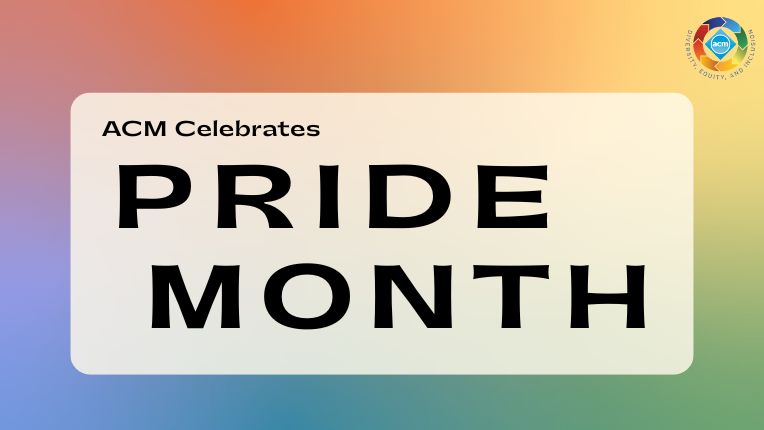
Every June, ACM proudly celebrates Pride Month by honoring the achievements and innovations of LGBTQ+ computing professionals. Throughout June 2025, ACM spotlighted articles centered on LGBTQ+ topics and technology. With technology offering many opportunities to support the LGBTQ+ community, featured authors examined both its benefits and potential challenges. These articles encourage developers to include LGBTQ+ individuals when designing inclusive user interfaces and technologies. Articles are available to read for free on ACM Digital Library and Communications of the ACM. Learn more here.
MEMBERSHIP
Featured Member Benefit: Reliable Life Insurance for ACM Members
Protect your loved ones with Group 10-Year Level Term Life Insurance—designed exclusively for ACM members. Lock in affordable, level rates and apply for up to $1 million in benefits. Coverage stays consistent for a full decade. Click here to learn more and apply or call 1-800-503-9230.
LEARNING PROGRAMS
ACM ByteCast Interviews
ACM ByteCast is a podcast series from ACM’s Practitioner Board in which hosts Rashmi Mohan, Bruke Kifle, and Scott Hanselman interview researchers, practitioners, and innovators who are at the intersection of computing research and practice. In each monthly episode, guests will share their experiences, the lessons they’ve learned, and their own visions for the future of computing. Recent ByteCast interviews include:
- 2016 ACM Software System Award recipient Alfred Spector, Professor of Practice in the MIT EECS Department, recounts how he initially pursued programming out of personal enjoyment in college, the challenges of turning academic research into commercial products, the differences between startups and large corporations some of his most notable work as a technical leader at Google, such as Google Translate, and more.
- Henrique Malvar, a signal processing researcher at Microsoft Research (Emeritus) explains his early love of electrical engineering, fulfilling his dream of researching digital signal processing at MIT. He describes his work as Vice President for Research and Advanced Technology at PictureTel, the importance of working with customers to solve a variety of technical challenges, and more.
- Kate Kallot, founder and CEO of Amini, an impact-driven AI company based in Nairobi which focuses on the critical issue of data scarcity in Africa and its implications for AI development, explains the barriers to AI adoption in Africa, shares her work collecting and validating data in key areas such as climate and agriculture, the global applications of Amini’s work in Africa, and more.
Listen to ACM ByteCast interviews here, or wherever you get your podcasts.
Featured TechTalks
ACM members and non-members alike are welcome to attend our popular series of free TechTalks by expert industry professionals, distinguished ACM award laureates, and visionary researchers from industry and academia. Recent TechTalks include:
- In “An Elementary Approach to Quantum Computing,” Charlee Stefanski and Constantin Gonciulea, authors of Building Quantum Software, explore quantum computing from a developer's perspective, using accessible computing and math concepts typically taught in the first year of computer science. Expect an emphasis on intuitive visualizations and animations to bring the subject to life.
- In "Programming for All: A Feminist Case for Language Design," Felienne Hermans, Professor of Computer Science Education at the Vrije Universiteit Amsterdam and a creator of programming language Hedy discusses the history of programming languages and gender and her latest paper on feminism and programming language design. She will reflect upon how programming language construction came to be so male dominated, and how with that also an overwhelming masculine discourse was formed.
- In "Dynamic Neural Network Compression for Scalable AI Deployment" Aditya Challapally, Microsoft Applied Science Lead, introduces Dynamic Neural Network Compression, a framework for real-time compression and decompression of deep learning models. Viewers will gain insights into new techniques for scalable AI deployment across cloud and edge environments.
Find our entire archive of TechTalks here.
EDUCATION
On Demand: “Global Perspectives on the Ethical and Societal Impacts of Generative AI in Education"
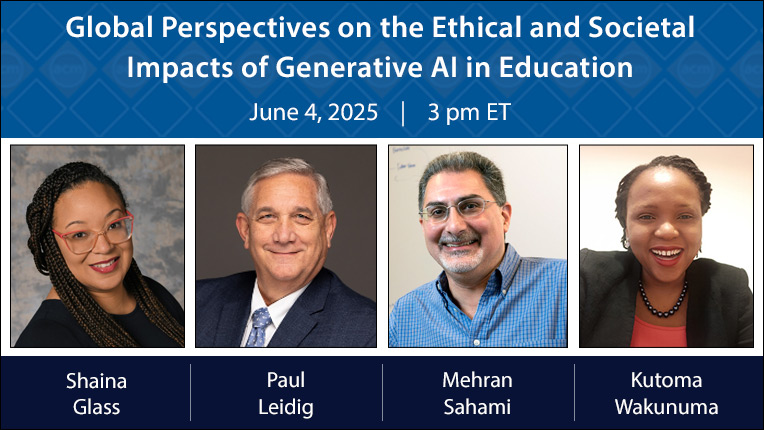
In this webinar, Kutoma Wakunuma (De Montfort University), Mehran Sahami (Stanford University), Shaina Glass (Computer Science Teachers Association), and moderator Paul Leidig (Grand Valley State University, ret.) explore the ethical and societal impacts of Generative AI from global perspectives. They will delve into questions such as: What are some key considerations related to AI governance? What are perspectives related to trustworthiness in the age of Generative A. View the webinar here.
STUDENT NEWS
2025 SRC Grand Final Winners
The ACM Student Research Competition (SRC) has announced its Grand Finals winners. The SRC Grand Finals are the culmination of a year-long competition that involved more than 325 computer science students presenting research projects at 21 major ACM conferences.
Graduate Category:
- First Place: Jordan Pettyjohn, Colorado School of Mines, "Mind Your Manners: Detoxifying Language Models via Attention Head Intervention " (SC 2024)
- Second Place: Haowen Lai, University of Pennsylvania, "Enabling Visual Recognition at Radio Frequency" (Mobicom 2024)
- Third Place: Vaastav Anand, Max Planck Institute for Software Systems, "Online Specialization of Systems with Iridescent" (SOSP 2024)
Undergraduate Category:
- First Place: Jason Han, Rice University, "Turning Quantum Noise on its Head: Using the Noise for Diffusion Models to Generate Images" (SIGMETRICS 2024)
- Second Place: Craig Liu, Purdue University, "Gradual Verification of Fractional Permissions" (SPLASH 2024)
- Third Place: Jizheng He, University of Illinois, Urbana-Champaign, "Extended-Range Two-way Radar Backscatter Communication with Low-Power IoT Tags" (Mobicom 2024)
Upcoming ACM Student Research Competitions: Submission Deadlines
ACM Student Research Competitions (SRCs) offer a unique forum for undergraduate and graduate students to present their original research at well-known ACM-sponsored and co-sponsored conferences before a panel of judges and attendees. The most recent SRC winners were presented at ICSE 2025. The next conferences accepting submissions are:
- CHI 2026, April 13–17, 2026, deadline January 22, 2026
- SIGCSE 2026, February 18–21, 2026, deadline October 2, 2025
- SC 2025, November 16–21, 2025, deadline August 18, 2025
CHAPTER NEWS
Welcome New ACM Chapters
Chapters are the "local neighborhoods" of ACM. The regional ACM Professional, Student, ACM-W, and Special Interest Group (SIG) chapters around the globe involve members locally in competitions, seminars, lectures, workshops, and networking opportunities. 17 Student and 10 Professional Chapters were started in Australia, Brazil, Canada, Ethiopia, India, Israel, Malaysia, Pakistan, Peru, the United Kingdom, and the Unites States.
ACM welcomes the new chapters that were chartered May 7, 2025 through July 27, 2025.
Submitting ACM Annual Report
ACM's fiscal year is closed which means it is time to submit your ACM Annual Report. The report is for the fiscal year 2025 (July 1, 2024 - June 30, 2025) and should be submitted by August 31, 2025.
To complete the report online, you must log in with your unique chapter web account. Please note, your chapter web account is entirely separate from your personal web account and should be accessible to all officers at: http://www.acm.org/chapters/chapters/interface. If you are unsure of your chapter web account or need to reset the password, please use the following link: https://www.acm.org/chapters/web-account-links.
DISTINGUISHED SPEAKERS PROGRAM
ACM Distinguished Speaker: Rik Das
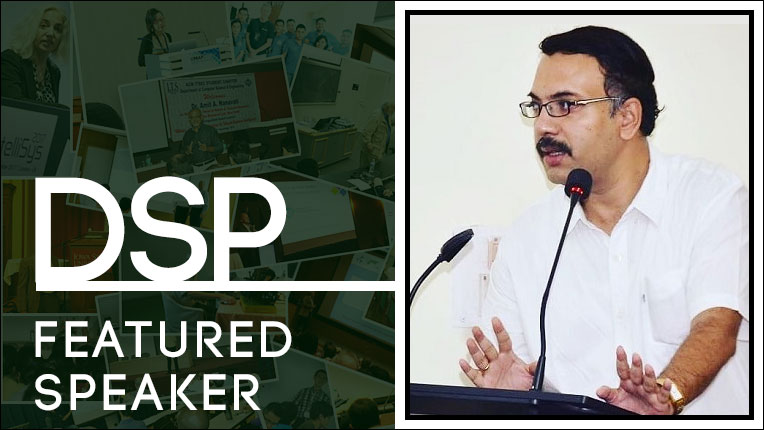
Rik Das is a highly accomplished professional currently serving as a Principal Consultant (AI / ML) at PwC India. With an impressive background in both industry and academia, Das has garnered over 19 years of experience in Industrial and Academic Research, making him a distinguished thought leader in the field. His expertise and innovative mindset led him to be recognized as an influential figure in the industry. His lectures include "An Image Data-Based Perspective on Data Science," "Is Traditional Image Processing a Lost Art?," and more. For more information about Das, please visit his DSP speaker information page.
All speakers are available through ACM's ACM Distinguished Speaker Program.
SOCIAL MEDIA
Celebrate Disability Pride Month with ACM
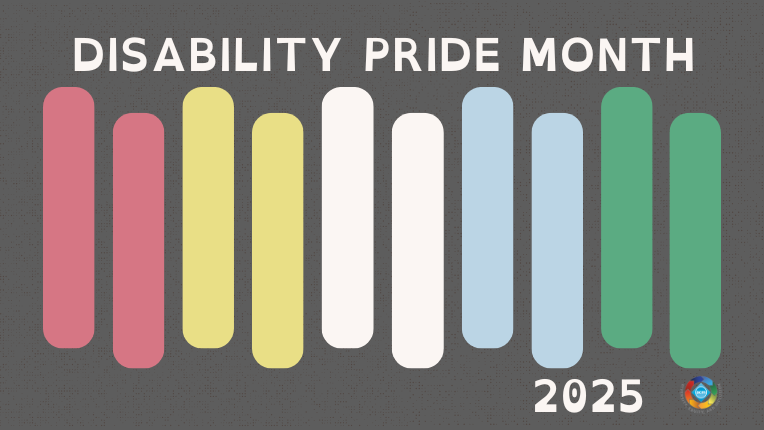
This 2025, ACM highlighted the significance of assistive technologies in cultivating inclusive environments. From screen readers to mobility aids, assistive technology plays a vital role in transforming workplaces, classrooms, and daily life for all. Disability Pride Month offers an opportunity to reflect on the assistive technologies that we use or supports us. Learn more here.
ACM CAREER & JOB CENTER
The Ultimate Career Development Destination
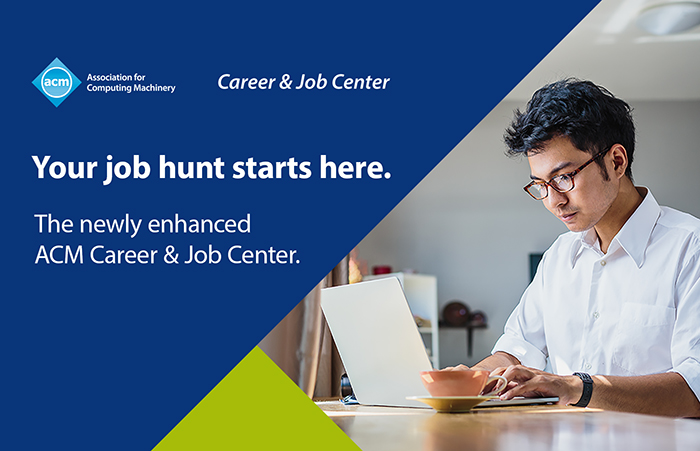
Connecting with the right employers in computing can be a daunting task. The ACM Career & Job Center is a true career planning destination. Whether you are seeking Career Insights, Career Advice, or Career Coaching, ACM can help.
Read past issues of MemberNet online in our archive.
Is there a person, event, or issue you'd like to see covered? Please email [email protected]